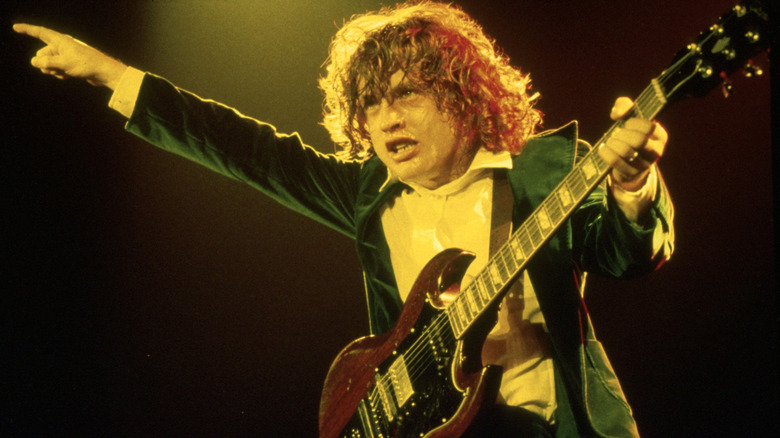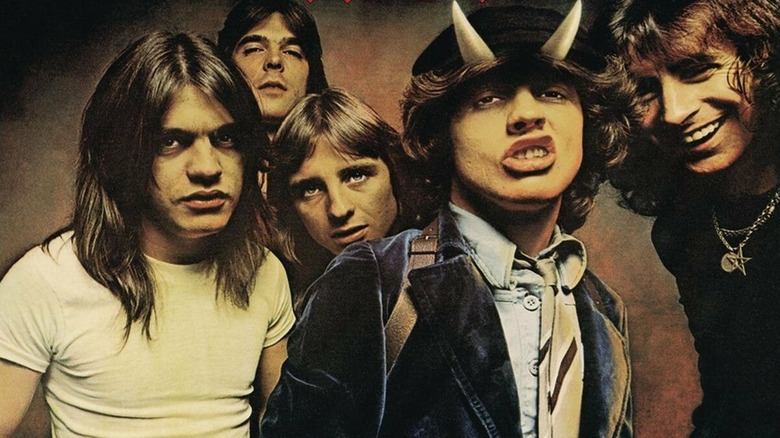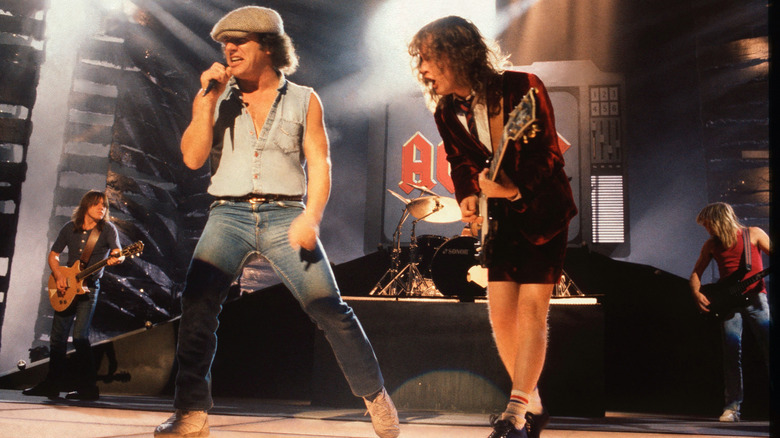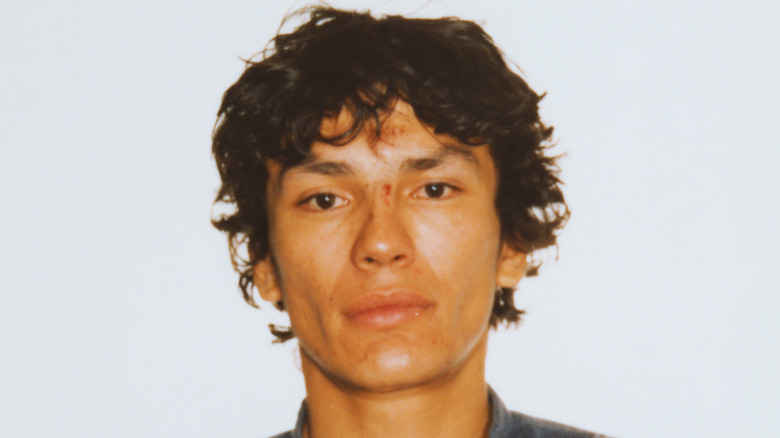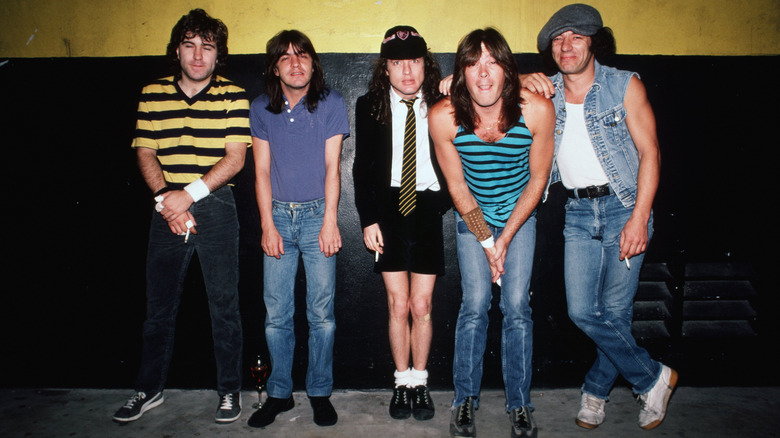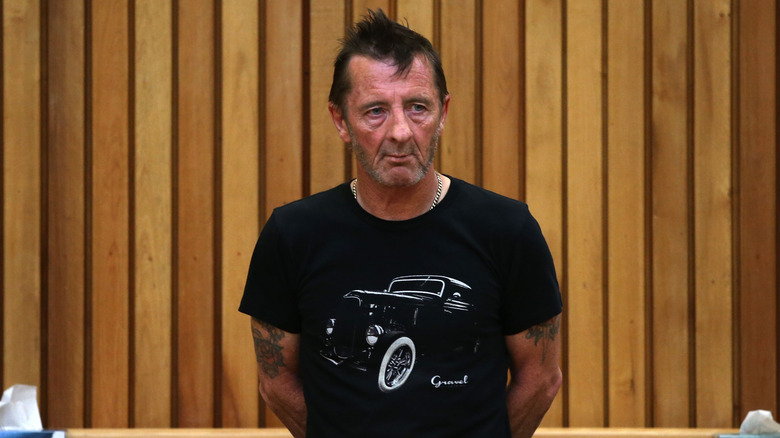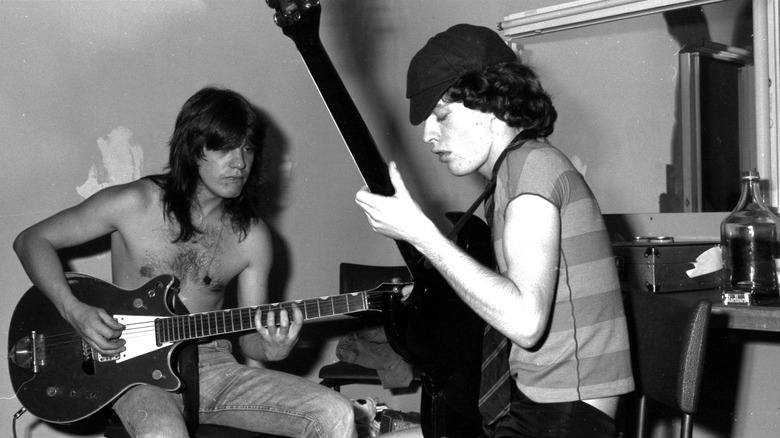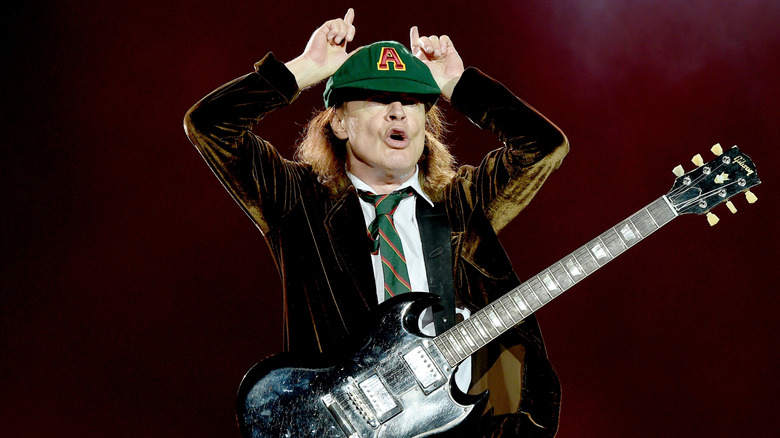The Biggest Scandals To Ever Hit AC/DC
Let's talk about one of the most important rock bands of the 1970s: AC/DC. Since the early days to the current era, the rockers haven't skipped a beat, touring around the globe and delivering chart-topping hits like "Highway to Hell," "You Shook Me All Night Long," "Back in Black," and "Thunderstruck." Chances are if someone hasn't seen the group live or even on television, they have heard at least one of their tracks, which have become staple pieces of major sporting events and classic rock radio stations.
With fame comes infamy, though, and AC/DC experienced their fair share of scandal and controversy since their formation. Whether it be about an alleged connection to the horned one that doesn't sit well with religious groups to their unintended link to the notorious serial killer Richard Ramirez, better known as the Night Stalker, there are several stories about the band that have raised countless eyebrows and filled numerous news columns.
While AC/DC's biggest controversies pale in comparison to Mötley Crüe's, they're still shocking enough to ensure the group's place as one of rock 'n' roll's most scandalous bands of all time. So, let's roll back the clock and look at the instances in which AC/DC made the headlines for all the wrong reasons.
AC/DC's Highway to Hell fired up religious groups
The 1980s are remembered for the time in which the government went to war with music. Parent and religious groups weren't fans of rock 'n' rollers and their supposed subliminal evil messages, demanding that the government protect the purity of the youth and take down the big bad rock bands. As it turns out, AC/DC played a part in the burgeoning "Satanic Panic" because of their 1979 album, "Highway to Hell." While an immensely successful record in America, the title and cover image ruffled the feathers of those who feared it was a detailed map on how to get to the "Bad Place."
Years later, AC/DC's guitarist Angus Young spoke to Total Guitar about the "Highway to Hell" outrage. He explained how the band was unfamiliar with this type of puritanical attitude in their native Australia, so this all felt new to them. That said, he revealed that the band's record company worried about the album's title when it first found out about it.
What surprised Young the most was how there were people protesting outside of their shows. "I said, 'Who are they here for?' And they said, 'You!'" Young said. "And we had that thing — that if you play the record backwards you get these Satanic messages. F***ing hell, why play it backwards? It says it right up front: Highway to Hell!"
One of the band's concerts ended in tragedy
After releasing "The Razors Edge" in 1990, AC/DC toured the album worldwide. In January 1991, one of the stops was the Salt Palace in Salt Lake City, Utah. Every ticket sold was general admission, which meant there were no seating categories nor division for those in attendance. It turned into a major problem after 13,000 people flooded the venue and rushed to get to the front of the stage as AC/DC performed. A stampede broke out and fans were trampled in the process. Ultimately, three teenagers died.
When the band found out about what happened, they wanted to stop the show, but they were asked to continue to prevent further agitating the already incited crowd. AC/DC singer Brian Johnson revealed that the incident hit the group hard and it was particularly tough to swallow what was reported thereafter. "I think what hurt most is, the next day in the newspapers they were saying, 'Band played on while kids died about them,' and they had a photograph of me with a smile on me face," he said. "It was just journalistic opportunity that just went beyond the bounds of decency. I was so just angry and hurt."
The families of two of the victims, as well as others who experienced and/or were injured in the incident, sued both AC/DC and Salt Lake County. The matters were settled out of court.
AC/DC has been accused of promoting sexism
There was an era when the rock genre was closely associated with the concept of sex, drugs, and rock 'n' roll. AC/DC was no different, as the band loved to sing about two main topics: Partying and women. Nearly every track was about living it up or indulging in sexual relations with the ladies. Heck, even music videos, such as "Play Ball," feature scantily clad women for absolutely no reason whatsoever beyond the "sex sells" approach.
Expectedly, this has drawn the ire of certain parts of the music community who view AC/DC's music as misogynistic and sexist. In fact, one of the most notable people who couldn't stand the lyrics was Nirvana's Kurt Cobain. According to Nirvana manager Danny Goldberg's comments to Forbes, Cobain appreciated the group's music, but he couldn't get behind the lyrical content.
For AC/DC, however, they view their entire approach to music as a good time and tongue in cheek. Angus Young told the Los Angeles Times that there's nothing sinister nor malicious behind their tracks. "What happened to people's sense of humor?" Young asked. "We're kidding. We're more of a tease than anything. We're more like naughty little boys, not out-and-out villains."
The band's music was linked to Richard Ramirez
In 1985, AC/DC joined the list of celebrities connected to infamous serial killers — not by choice, though. As police investigated one of the cases involving the serial killer Richard Ramirez, also known as the Night Stalker, they revealed a critical piece of evidence left behind at the scene of the crime: An AC/DC cap. Naturally, this sucked the band into the news cycle — albeit not in a positive manner — but matters took another worse turn when Ramirez was caught and a friend of his revealed that the killer used to listen to AC/DC's music. All of a sudden, certain media personalities started making a causal link between the Night Stalker and the band's track "Night Prowler" (which was from 1979's "Highway to Hell" album), questioning if the band's music inspired Ramirez to commit his crimes and if they were Satanists too.
As AC/DC's Malcolm Young told VH1's "Behind the Music," the whole thing was ridiculous because "Night Prowler" was a song about sneaking into a girlfriend's home after her parents went to bed — not murder. The damage had been done, though, as many people believed the speculation, regardless if it was true or not.
Much like his fellow band members, Brian Johnson wasn't a fan of having his name connected to Ramirez's crimes. "It just sickens you, you know," Johnson said. "It sickens you to have anything to do with that kind of thing."
A former manager died under shocking circumstances
Crispin Dye worked as AC/DC's manager for seven years in the '80s, driving the band to success during the "Fly on the Wall" album era. On December 23, 1993, Dye went out for celebratory drinks to commemorate the release of his own record when he was brutally attacked. He was transported to hospital for treatment, but Dye died from his head injuries on Christmas Day. He was 41 years old.
For decades, the police attempted to solve the case of who killed Dye, with the authorities even offering a $100,000 reward for anyone who could help them find the murderer at one point. There was some belief that the attack could have been related to a hate crime, but the police initially dismissed it as nothing more than a senseless robbery since Dye's wallet had been stolen.
In 2023, a new person of interest was identified. After a special commission into LGBTQ+ crimes was ordered, DNA on Dye's clothing was matched to DNA from another crime committed in 2002. Bizarrely, the police had never done a forensic investigation on Dye's clothing up until that point. The DNA match was of a man referred to in the inquiry as NP252, who had since died in 2002. To date, Dye's murder case, and the motivations behind it, remain unsolved.
Bon Scott visited two different mothers in the same maternity ward
Michael Browning served as AC/DC's manager for five years. In that time, he experienced the rock 'n' roll lifestyle of the band members — specifically vocalist Bon Scott, who was renowned for being a heavy partier. Browning decided to put down all his stories and recollections of the group in a book titled "Dog Eat Dog."
Speaking to the Daily Mail Australia about his book in 2014, Browning recalled one particular incident involving Scott. The former manager discussed how the singer had a bad trip with drugs that resulted in Scott being taken to hospital for treatment. "When I visited him the next day in hospital, he was kind of chirpy and having a bit of fun with a couple of the nurses," Browning said, "then he made the comment that the last time he was in hospital was to visit two women who were both having his babies."
Browning admitted that he's uncertain if Scott remained in touch with the mothers of his children, or if the children even know about each other's existence; however, he said Scott was something of a lothario in those days.
If you or anyone you know needs help with addiction issues, help is available. Visit the Substance Abuse and Mental Health Services Administration website or contact SAMHSA's National Helpline at 1-800-662-HELP (4357).
There's debate over who really wrote Back in Black
The tragic death of AC/DC's Bon Scott in 1980 was a watershed moment for the band. They had been on a meteoric rise with Scott as a front man. Now, he was gone and they had a choice to make: Give up or continue with a new vocalist. The band chose the latter option, enlisting Brian Johnson as the new singer and soldiering ahead.
A few months later, they released what's generally considered one of the best rock albums of all time: "Back in Black." However, the short timeline between Scott's death and the release of the record has caused a debate over who wrote the lyrics. Was it Scott or Johnson? This argument wasn't aided by a long-standing conspiracy theory that AC/DC used the lyrics that Scott had scribbled in his notebook.
Johnson put these rumors to bed in his memoir "The Lives of Brian," as well as in an interview with The Daily Telegraph. He told the publication that he was aware of the conspiracy theory and added, "What band would let somebody else claim somebody else's lyrics? I mean, it's just absolute nonsense. And that's why I put it in the book, to say for once and for all, those lyrics came from the end of my hand with a pen in it."
AC/DC's drummer was charged with attempted murder
In 2014, AC/DC drummer Phil Rudd was charged with attempting to solicit a hitman to murder two people. It wasn't the first time that Rudd had experienced a run-in with the law, but it was by far the most shocking of incidents yet. In 2015, Rudd pled guilty to one of the two counts, as well as the possession of drugs. The court discovered how Rudd had been unhappy about the reception toward his solo album, so he called up an individual to kill his personal assistant in retaliation.
In terms of his sentence, Rudd received eight months of house arrest, which resulted in him being replaced by drummer Chris Slade for AC/DC's tour dates. Speaking to the BBC about Rudd's situation, Angus Young admitted that the band had experienced problems with Rudd prior to his arrest. Young said, "Even when we were recording it was hard even to get him to do the recording. And then he was supposed to show up to do promos with us, to do video shoots and a few other things, and he never showed up for that either."
Rudd officially returned to AC/DC in a full-time capacity in 2020.
The Young brothers' childhood home was accidentally demolished
Thanks to their achievements with AC/DC, the Young brothers — Angus, Malcolm, and George — are regarded as rock 'n' roll royalty in Australia. So much so that their childhood home in Burwood, Sydney was officially added to the National Trust List of Historic Homes in 2013. In other words, it was seen as something of a national treasure.
That didn't stop a developer from bulldozing it to pieces in 2023, though. After having bought the property for AUD 5.8 million, the developer tore it down, claiming to not have been informed about the property's importance until after it had executed the demolition job.
Speaking to the media in 2025 (via news.com.au), Burwood Square Pty Ltd's Leon Kmita apologized and alleged that the former owner of the property hadn't relayed the information about the house's significance to the company. Kmita stated that they were seeing if they could use the remaining pieces left behind from the destruction site to craft a "special space" for AC/DC fans in the future.
The brief period where Axl Rose was AC/DC's frontman didn't delight fans
In April 2016, news broke that Brian Johnson was experiencing hearing issues and AC/DC had replaced him with Guns N' Roses vocalist, Axl Rose, for the remaining dates of their tour. Fans were blindsided by the decision, with many wondering if it had been an April Fools' prank or why Rose had been chosen in the first place. Heck, it was also fair to question how Rose, who notoriously can't make it to the stage on time for his own band's shows, would even be able to cope with this double musical shift.
To make matters worse, there was outrage that AC/DC made the decision to replace Johnson without telling him. This arose due to the comments made by Johnson's friend and comedian Jim Breuer, who alleged that the band planned to oust Johnson. Breuer walked back his statements on Facebook and claimed to "exaggerate" and "get a little carried away" when he first spoke about the issue.
Johnson eventually released his own statement to his fans, explaining the severity of his medical situation and how he was uncertain if he would be on stage with AC/DC ever again. However, he was quick to squash any potential animosity between him and the rest of the band by thanking them and saying he would be back in the studio with them at some point. Johnson rejoined the band on stage in 2023.
The band allegedly only participates in puff pieces
AC/DC wouldn't be the first band to have an antagonistic relationship with the media. Many musicians hold a general distrust toward the press, believing reporters may sensationalize or exaggerate their comments to garner more eyeballs on the piece. That being said, doing interviews is seen as a necessary evil in order to get information out about albums and tours.
According to music journalist and author Jesse Fink's feature article on Spin, "AC/DC is notoriously a 'closed shop' to serious biographers" and doesn't like to participate in anything too deep about the band. Fink is known for writing two biographies based on the band, "The Youngs: The Brothers Who Built AC/DC" and "Bon: The Last Highway"; however, as the author revealed, the band was far from cooperative with him while he wrote the books.
Fink added, "What interviews band members do give are invariably lightweight puff pieces with sycophantic radio jocks, podcast hosts, and rock journalists whose idea of journalism is to seemingly regurgitate a record-company press release, ask fawning questions so as not to provoke or anger anyone lest future 'access' to those same band members be denied, or simply copy and paste an article off Wikipedia." Due to this, Fink had to dig deeper for facts and interview a multitude of other people to get the full story on AC/DC, since the band wasn't open with him.
Want to read more about the band? Check out the untold truth of AC/DC.
